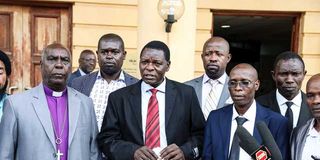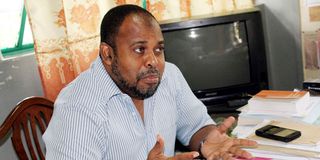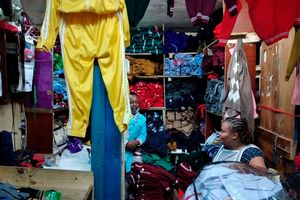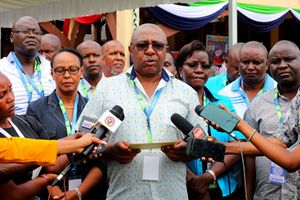
Parents have complained about being asked to pay huge bribes to have their children admitted to popular public schools.
Parents have complained about being asked to pay huge bribes, ranging from Sh40,000 to Sh100,000, to have their children admitted to popular public schools.
Transferring a child to a popular public primary school is now an expensive affair with, new parents forced to make huge payments couched in a raft of levies, with the total fees almost rivalling what is charged by private schools.
The fees are much higher if you are trying to get your child from primary to junior school, another lucrative venture for head teachers who are cashing in on the Competence-Based Curriculum (CBC).
And parents fear that the rip-off, which was common during Form One admissions, will escalate with admissions to senior school for the pioneer cohort of learners who will join Grade 10 in January.
A Nation investigation reveals public schools are demanding payments from new parents in two parts: a fee to secure a slot for their child and then more payments through a raft of levies.
Parents are now questioning the free primary education government policy as some of the popular primary schools are charging levies that are almost equal to private ones, and fees in public secondary schools are out of reach for some households.
Ms Maimuna Ahmed tried to transfer her Grade Five child from a public primary school in Dagoretti but hit roadblocks at every turn. All the three primary schools she visited in Westlands, Kabete and Starehe each demanded Sh30,000 acceptance fee. And once the child was admitted, she had to pay extra levies, including a fee to pay teachers hired by the school’s board of management (BoM).
“Despite them being public schools, I was asked for bribes just to get teachers to approve my child’s transfer even though he was qualified. On top of the acceptance fee, I had to pay school fees, motivational fees, development fees and contribute to supporting BoM teachers. The costs kept piling up,” said Ms Maimuna.

Parents have complained about being asked to pay huge bribes to have their children admitted to popular public schools.
Given the total costs she would have to pay, she opted to enrol her child in a private school.
“Public schools have changed so much. Back in the day, in Dagoretti, I only had to pay Sh2,000,” she said.
Another parent recalled she paid Sh25,000 to transfer her child from a school in Dagoretti to another in Westlands three years ago.
“I don’t know what the parents are paying now. What is the difference between private and public, because we are paying a lot of money in public schools?” she asked.
The same situation applies in junior school, where teachers are demanding high fees, citing approvals by the Parents Teachers Association (PTA).
“I was asked to pay Sh40,000 for my child in junior school. They tell us it’s a PTA decision, what choice do we have? Schools have become a cash cow and parents are suffering. What’s the difference between public and private schools?” Mr Joseph Mwaniki, a parent in Nairobi, asked.
“This is not free education; you spend much more money in junior school. I have not added the other costs that we are being told to pay like infrastructure. Some money we are asked to send via M-Pesa. Some of this is orchestrated by other parents. It’s frustrating and we are not yet in senior school,” lamented another parent in Nairobi.
This demand for bribes for admissions to primary and junior schools will only add to the burden of parents who have had to contend with such demands to secure Form One admissions. And basic education will be out of reach to children from poor families.
“I work at a national school as a teacher. You see those children from poor backgrounds who fail to report because their parents cannot afford school fees, they (principals) sell those vacancies for Sh100,000,” a teacher said in confidence.
A senior government official acknowledged this bribe-taking is rampant in top secondary schools.
“My colleagues and I have come across several troubling trends in some of Kenya’s top schools—institutions we’ve directly interacted with, said the official. The source named some top schools, saying they either expel students in Form One to create vacancies that are then sold, or capitalise on students who fail to report to quickly fill those spots under questionable circumstances.
According to Mr Silas Obuhatsa, the National Parents Association chairperson, while education is officially free at the primary level, the reality is far from it.

National Parents Association Chairman David Obuhatsa Silas (centre) and other members of the association.
Parents are still expected to pay for uniform, books and other educational materials under a cost-sharing mechanism that he says is only an avenue to milk parents dry.
With many families struggling to meet basic needs, let alone cover school expenses, these exorbitant levies are seeing many children drop out of school.
“The government has always talked about free primary education, but what does it actually mean for parents? There should be a meeting between the government and parents to explain what free or affordable education really means. Many parents wonder what this means because they are paying half the costs,” Mr Obuhatsa said.
“Education is not free, it’s cost-sharing, parents still have to shoulder a significant portion of the expenses, which is becoming increasingly difficult for many families. The government must come out and explain how it can support the parents. And if it is possible, let the government make education completely zero fees,” he added.
Mr Obuhatsa also noted that at the secondary school level, parents are often required to pay up to Sh100,000.
“For many parents who are struggling to even put food on the table, this is an impossible burden,” he said.
Additional payments, often labelled as motivational or development fees, are sometimes handed directly to the class teacher or parent representatives. In some schools, cash is requested to keep the transaction off the record. Although some of these are advertised as voluntary contributions, pressure is applied to those who don’t comply.
“I couldn’t afford the fees for remedial classes, then my child came home and told me the teacher was excluding her from class and group discussions. Even when she knew the answer, the teacher wouldn’t call on her. It was a guilt trip to make me pay,” said Ms Peninah Muthoka.
Kenya Primary School Heads Association chairman Fuad Ali said many parents are unaware of the digital steps involved, leading to delays and frustrations.

Kenya Primary School Heads Association chairperson Fuad Ali.
“All a parent needs is a transfer form from the current school with key details, especially the learner’s Nemis number. The receiving school must accept the learner on the portal, and the releasing school must finalise the release on their end to complete the transfer process,” he said.
When the government rolled out its free primary and day secondary education programmes, the promise was clear: every Kenyan child would access education without the burden of fees. In April, feedback from stakeholders during the county-based dialogues revealed a lack of clarity regarding the provision of free education in senior schools.
Ministry of Education officials did not respond to our enquiries.








